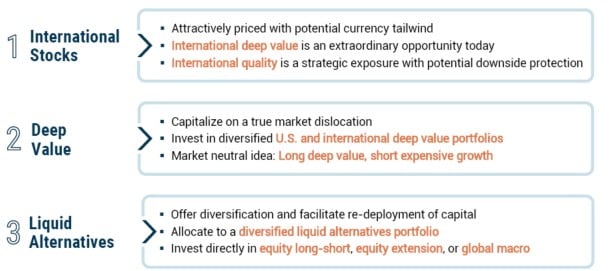Overview
Ben Inker and John Thorndike (Asset Allocation) and Tom Hancock (Focused Equity) reflected on how their positioning has fared amid market volatility, shared reactions to recent tariff announcements, and made assessments of potential future scenarios and outcomes.
Contact Us to Watch the Replay*
*This content is intended for accredited investors only.
GMO Asset Allocation’s Big Bets

As of 4/10/2025
Q&A Highlights
Q: With yesterday's (4/9/2025) reprieve from extreme tariffs, is global recession off the table?
Ben: Yesterday's announcement was unquestionably good for the global economy, but this does not take recession off the table. The supply shock from a tariff perspective is now a little bit better for the U.S., but the U.S. is still facing a very significant supply shock. Beyond that, a real problem for corporations and a real problem for the economy is uncertainty. The very high levels of uncertainty we are seeing right now should cause corporations to want to make pauses on investment decisions, make pauses on hiring decisions, and that is also negative for the economy.
Q: Any surprises over the last week in the market’s reaction to the Liberation Day tariffs?
Ben: I'd say the thing we have been most surprised by other than extreme violence in the markets has been the reaction of the dollar. When we wrote in the recent GMO Quarterly Letter that the dollar should strengthen, there was a key assumption that foreign investors would still want to hold, own, and buy the same amount of U.S. assets. What we have seen instead is the dollar weakening, which implies that these actions have probably caused foreign investors to rethink how much they want to own in the U.S. That is another potential problematic issue for the U.S. stock market and for U.S. financial markets. We always knew it was a possibility, but frankly, I've been a little bit surprised by how quickly that rethink seems to have hit.
Q: Could the less stable policy eventually erode U.S. exceptionalism?
John: Certainly, bad policy and massive economic uncertainty are things that would cause many investors to reconsider the premium they are willing to pay for U.S. stocks. And at the same time, you are seeing good signs elsewhere. Japan has improved return on capital and improved corporate governance. We have seen in Europe increased odds of fiscal stimulus and investment in defense. If Europe doesn't let a good crisis go to waste, good things could happen there.
Q: How are high quality companies weathering today’s environment?
Tom: Three main things are moving individual stocks:
- The direct effects of tariffs (or the lack of tariffs)
- The broader concern about recession
- General risk aversion - for some stocks the fundamentals haven't really changed, but people are less inclined to take that risk
Where quality really shines is the second point: if we are going into a recession, a quality focus with attention to valuations is going to give you companies that are more resilient. Healthcare, our second biggest sector after Tech, and our biggest overweight, has been a star performer over the last week.
Q: Have any opportunities come out of market volatility?
Tom: AI (artificial intelligence) is an area where we are interested in a contrarian way. The ultimate story behind AI isn't really affected, and if the stocks are cheaper than a week ago that is certainly interesting. That is not to say every AI stock is attractive. These stocks have done very well over the last couple of years, but there have been some areas we’ve either added to or initiated new positions over the last few weeks. Conversely, we’re taking profits in the companies that have held up the best.
Q: What is your outlook for U.S. and International Quality?
Tom: For high quality stocks, the U.S. and Europe are more similar than they are different; the big difference is not the businesses, but the investor base. Earlier in the year, stocks outperformed on the back of European stimulus programs. For our international quality stocks, we were a little bit of a seller, actually, because the companies we hold are so global in their business that they're not really a beneficiary. Some of that has unwound, so we are mildly positive on Europe and ex-U.S. names.
Q: What is a catalyst for value to outperform growth?
Ben: One of the things we do believe operates in value’s favor most of the time is change. When you have companies that are priced at high valuations because people are confident that the future is going to be really bright for those companies, they become vulnerable if people think the world is going to change. The companies that are really cheap are cheap because people assume that bad things will happen and change often creates an opportunity for some of those things to wind up being better than expected.
Q: The Benchmark-Free Allocation Strategy has 30% allocation to liquid alternatives. Why such a large exposure?
John: There are structural reasons we like liquid alts and there are reasons specific to the current environment. Structurally, 300 to 400 bps of alpha above cash is a lot more alpha than we think we can get out of a government bond portfolio. Secondly, low correction is important. We're back in an environment where stocks and bonds have been moving together more often than not. Today, specifically, U.S. growth stocks are not priced to deliver strong returns; we reallocated that capital to liquid alts.
Q: What are your favorite diversifiers or alternatives strategies?
John: Our alts bucket right now has two main components. One is a big bet on Equity Dislocation, which is long cheap, high quality value, short junky, expensive growth. The remainder is in the Alternative Allocation portfolio which allocates to various underlying return sources:
- Event-driven
- Global macro which uses value and sentiment
- Equity long/short which relies on alpha and also Quality vs. Junk
- Trend across asset classes and within credit
- Volatility selling
These activities are taking risk, but they are taking risks that tend to be not perfectly correlated with either equity or bond moves.
Download highlight here.

